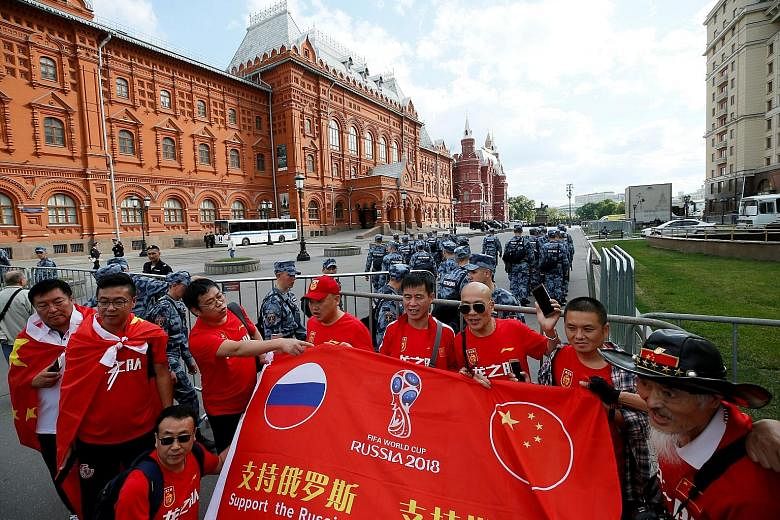MOSCOW • China wants to host the World Cup one day and Fifa is looking at the idea, but football fans around the world might be forgiven for thinking that a Chinese World Cup is already reality.
From stadiums across Russia, pitch-side advertising displays have been beamed worldwide on TV, carrying many messages in Chinese, which are undecipherable to most viewers.
Also notable have been the crowds of Chinese fans getting into the spirit of the Finals - even though their team failed to qualify.
Before the tournament, the Chinese bought over 40,000 tickets, two-thirds as many as the Germans and more than the English.
Football is growing fast in China under President Xi Jinping, and Chinese brands are using the World Cup to reach viewers at home. But many also see it as a way to enter new markets.
Eli Lavi, deputy general manager in Russia for consumer electronics maker Hisense, said sponsoring the World Cup was part of a strategy to build the brand abroad.
"Hisense's future lies outside of China," he said. "In China... they are No. 1 in TV and a well-known brand and, 10 years ago, they decided to reach out to the worldwide market."
At Nielsen Sports, which tracks sponsorship money going into Fifa, global managing director Glenn Lovett said that Chinese interest has helped Gianni Infantino, president of world football's governing body, offset a drop in income elsewhere following the corruption scandal which felled his predecessor Sepp Blatter.
Nielsen Sports calculated that Fifa has exceeded budgeted revenue, by US$200 million (S$272 million), to reach US$1.65 billion in sponsorship income for this budgetary cycle.
"China is an increasingly important market for Fifa. With interest around the sport in China growing, it is unsurprising that more Chinese brands are engaging with the World Cup," Lovett said.
Fifa last month awarded the 2026 competition hosting rights to the United States, Canada and Mexico, after Gulf emirate Qatar in 2022.
Neither Fifa nor Beijing will confirm an interest in holding the 2030 World Cup in China, but Mr Xi told Infantino last year that China hopes to host the Finals one day and the Fifa president wished for "many future projects together".
Hisense is also just one of three Chinese firms that Fifa lists among five World Cup sponsors, the others being smartphone maker Vivo and dairy firm Mengniu.
Others, such as menswear brand Diking, have regional deals with Fifa, while at the upper end of the payment scale, real estate conglomerate Wanda is among seven "global partners" of Fifa.
"Football has unique potential to bring the people together, and bring the community together. And this is exactly why Wanda has signed up with Fifa, not just for the 2018 World Cup, but until 2030," said Yang Hengming, president of Wanda Sports.
"For people in China, to work with Fifa, it brings real progress for those in China and around the world."
REUTERS

